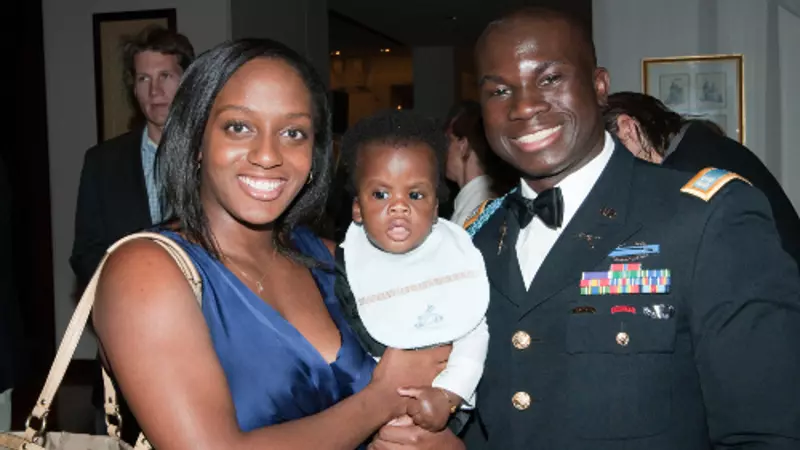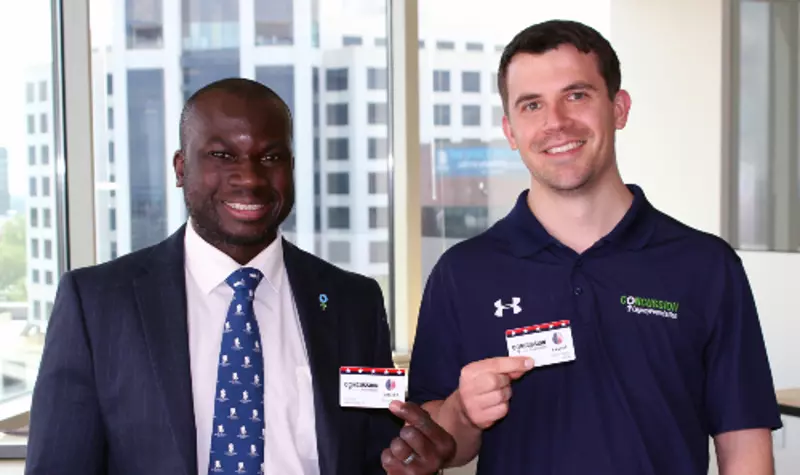
Posted: August 30, 2021
Retired U.S. Army Captain William Reynolds III has many titles: veteran, 2016 Invictus Games Captain, father and husband. He’s a survivor, who was gravely injured by a detonation device while in the line of duty. He’s also a Project Enlist brain pledge devoted to improving outcomes for his fellow veterans.
Reynolds’ military career began when he was a young cadet at the U.S. Military Academy in West Point. He was a Division I gymnast for four years before being commissioned in 2002 into the U.S. Army infantry. Eventually, he was deployed overseas and commanded small platoon units in Iraq and Korea.
His passion for service started when he was a young child.
“As a first-generation American, I was quick to recognize the opportunities I was afforded in this country,” said Reynolds. “I had so much gratitude and wanted to find a way to give back, so I became involved in a lot of civic and community engagements, either through scouting or church involvement. And that fueled the desire to go into service.”
Reynolds served in the U.S. Army for seven years. He can’t recall exactly how many blast explosions he’s been exposed to but estimates the number to be around two dozen. The most significant one occurred when his troop was ambushed in Baghdad and he stepped on a remote detonated IED. One of his legs was nearly blown off as he fought not to lose consciousness.
As it happened, Reynolds says he didn’t have time to consider the physical nature of his injuries or the possibility of brain trauma.
“The sensation from a blast is much different in a combat scenario, because your first feeling is the rush of adrenaline,” he said. “Making sure you’re all together, checking on your unit, doing the initial battle damage assessment. There’s really no time to think about, are my ears ringing? How does my head feel?”
Through the flurry of activity, the first two thoughts running through Reynolds’ mind were: I’ve failed my unit, and I don’t think I’m going to survive.
A team of combat medics who were tending to other casualties nearby happened on Reynolds and were able to give him proper care before medically evacuating him to a nearby treatment facility. There, he required intensive surgery and blood transfusions due to multiple severed arteries and musculoskeletal injuries. But that was only the beginning – over the next six months, Reynolds would go under the knife 12 additional times as doctors tried to salvage his limbs and get his leg back to a functioning state. In the end, they decided to amputate it to give him the best quality of life going forward. Altogether, his full course of treatment required an astounding 26 surgeries.
Although Reynolds was eager to get back to his responsibilities and his platoon, he quickly realized the physical and mental recovery would take much longer than he may have hoped.
“At first, I had lofty goals of returning to duty, but reality set in and I knew that would not be happening any time soon, and definitely not in the same capacity,” said Reynolds. “So I really set my sights at what was possible, such as being able to take more steps daily and seeing if I could stand for the whole day. Then it became trying to walk around the mall or not having to use a cane or assisted device – basically inching forward little by little.”
In the military, a convalescent leave is a free period of time after a major trauma an active member of duty can use to focus solely on treatment. For Reynolds, this was a godsend and something he is grateful for. He used the time to work with a physical therapist on basic movement and stay in touch with his troop.
From there, Reynolds continued his rehab through recreation, even picking up skiing. The liberation of picking up new, fun activities was thrilling – he started in a seated ski before eventually skiing upright with one leg and then finally with the use of a prosthetic. He credits his athletic background from college as key, as it instilled in him a training mindset and the desire to keep getting better.
While the visible injuries were healing, Reynolds also had to deal with the invisible ones – the persistent brain injury symptoms he noticed with activity. Reynolds has found any rapid or strenuous movements immediately lead to headaches. He realized how easy it can be to hide brain injury symptoms and suffer in silence.
“With any brain injuries, if you’re talking well and answering questions adequately, and it doesn’t seem like there’s any mental deficit – you pass the ‘screening test’, if you will,” he said. “People won’t necessarily know an event can cause headaches or there are scenarios where you can lose your balance at any time.”
Also essential to Reynolds’ recovery was the patience and support of his family. They stayed by his side during his treatments and made important medical decisions on his behalf. When he was out of the hospital, they made sure he had time to take care of himself and gave him the inspiration to realize his full potential both as a person and as a professional. His advice to caregivers? Find a way to give your loved one space and support throughout recovery.





